Eurovision 2022: How Sam Ryder turned things around for the UK
Sam Ryder #SamRyder

By Mark SavageBBC Music Correspondent
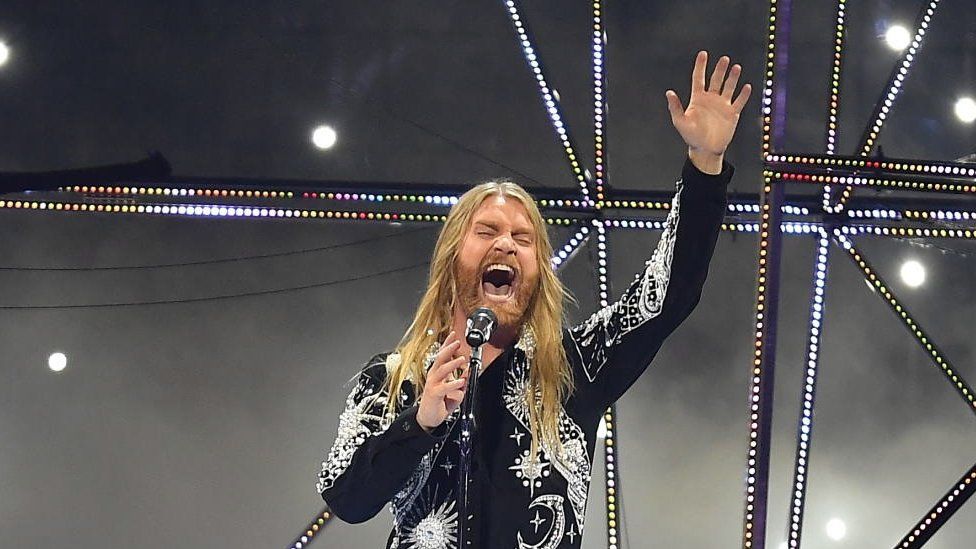
Image source, Reuters Image caption,
Sam Ryder topped the jury vote at Eurovision, ultimately coming second to Ukraine’s Kalush Orchestra
Fifteen years ago, I landed in Finland’s to cover my first ever Eurovision Song Contest.
That year, the British entry was Scooch’s Flying The Flag (For You), a trifling three minutes of kitsch nonsense.
And on the taxi drive from Helsinki Airport, my driver had something to say about it.
“Oh, you’re from England?” he inquired. “Your song is a joke.”
Scooch finished joint 22nd (out of 24), tying with France on 19 points. Malta later admitted they’d awarded 12 of those points in a symbolic protest over vote trading in Eastern Europe.
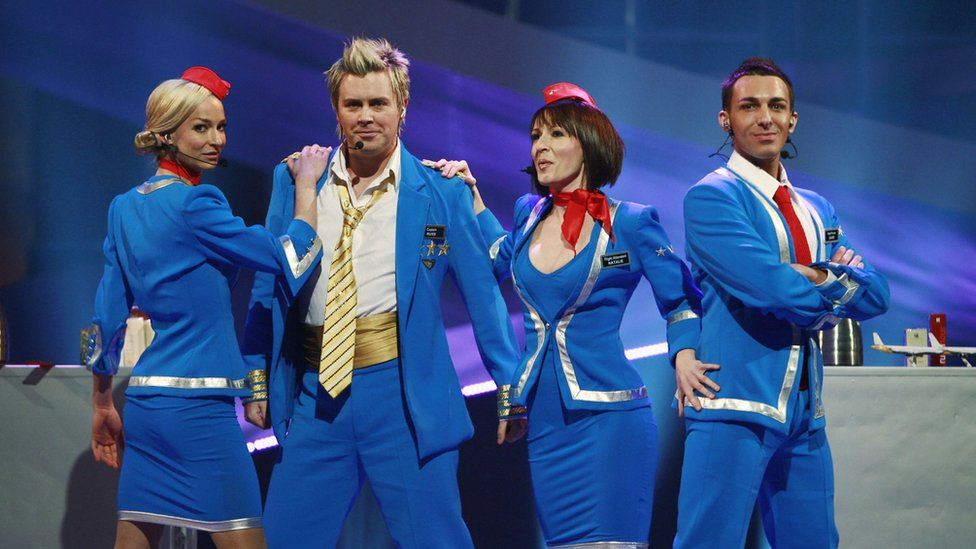
Image caption,
Scooch in 2007: Let us never talk of this again
For the next decade and a half, the UK didn’t fare much better. In 2019 and 2021, our acts took last place.
When I arrived in Turin last week, however, the taxi driver was delighted to see me.
“England! England is going to win,” he declared, before treating me to his interpretation of Sam Ryder’s Space Man.
In the end, Sam didn’t quite top the scoreboard, but he came close: taking the silver medal position and earning the UK’s best result since Imaani came second in 1998.
So how did the UK break its losing streak?
“I think it’s just a flip in attitude,” says Amy Wadge, who co-wrote Sam’s song, as well as hits for Ed Sheeran, Camila Cabello, Kylie and Alicia Keys.
“For a long time we, as Brits, built this thing up of, ‘Well, we’re just going to lose’.
“But this year the thinking was, ‘How about we don’t do that, and we look at it with the sort of respect that other countries do?”
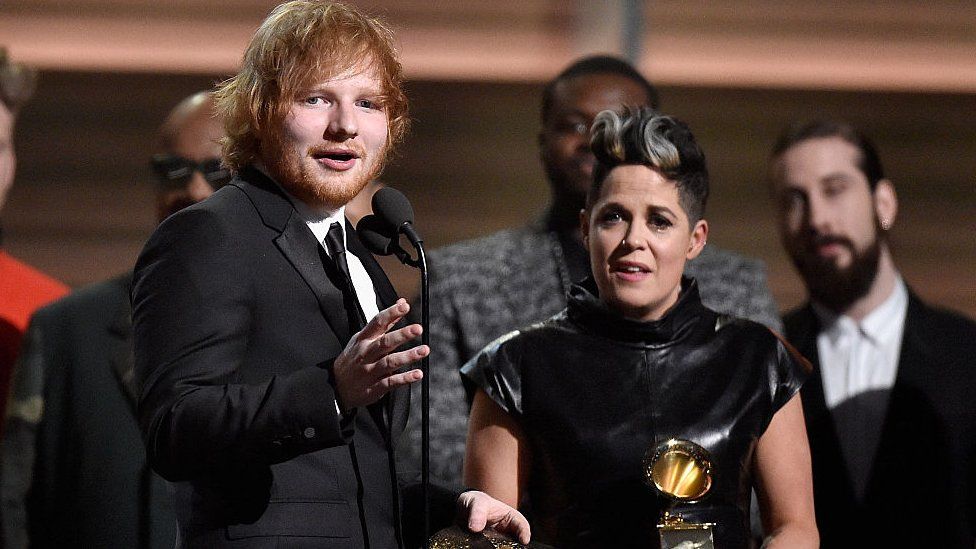
Image source, Getty Images Image caption,
Amy Wadge won a Grammy for her work with Ed Sheeran
And that’s the key. When Britpop was in its ascendancy in the 1990s, the UK decided Eurovision wasn’t worth the effort. It was outdated, irrelevant, and nothing to do with contemporary music.
Record labels stopped putting acts forward for the contest and, in turn, the standard of our entries dropped. By the mid-2000s, we’d entered a cycle of self-imposed decline, unable to escape the bottom of the scoreboard (with the notable exception of Jade Ewen and Andrew Lloyd Webber’s effort in 2009).
Faced with those disastrous results, the music industry distanced itself even further. Eurovision was a “poisoned chalice”, one record label executive told me. If you had spent thousands of pounds developing an act, why expose them to the risk of coming last and ending their career before it began?
Faye Tozer from Steps summed it up, when I asked if her band would put themselves forward for the 2021 contest.
“In an ideal world, everybody has this vision of Steps going to Eurovision and being the perfect act, with the perfect song, and we turn it around for the UK,” she said.
“But I think in reality, [winning] is just never, ever going to happen so it’s weighing up whether it’s worth that risk to us or not.”
Amongst the press and the public, conspiracy theories started to circulate about the UK’s lack of success.
Eastern European countries were voting for each other to win, they said, conveniently ignoring victories by Germany, Norway and Sweden.
Then it was Brexit. “Angry Europeans to use Eurovision to punish UK for leaving,” ran a typical headline in the Express in 2017.
But the UK’s average position in the three years before Brexit was 22. In the three years after, it was… 22.
No, the real explanation was more simple: Our songs were bad.
“Without being disrespectful to the artists who represented us for the past few years, it has been a case of ‘will this do’?” says Eurovision expert Jonny Carey.
“Very often, it has just been a case of churning something out that isn’t very Eurovision-friendly.”
And while the UK’s back was turned, Eurovision was becoming more credible. Acts like Loreen, Måns Zelmerlöw and Duncan Laurence were scoring genuine hits and establishing careers.
Then, in 2021, Måneskin won. The Italian rock band became an international success story, touring with the Rolling Stones, winning MTV Awards and achieving one billion streams of their hit song Beggin’.
“Having a band like that win, then have chart success around the world – and also breaking America – made people in the UK sit up and listen,” says Dan Shipton, who has designed the staging for the UK’s Eurovision entrant five times (including this year).
“It made people realise there is a place for Eurovision. There’s been a massive energy shift and it’s really exciting to be a part of.”
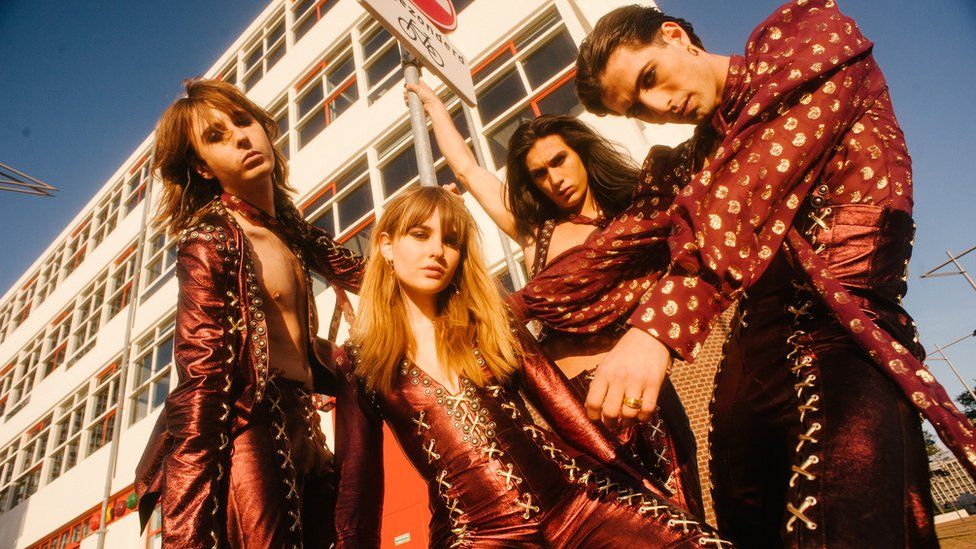
Image source, Sony Music Image caption,
Maneskin are the most successful act to emerge from Eurovision in recent years
Måneskin’s victory also coincided with the UK getting the dreaded “nil points”. That night the BBC’s Eurovision producer drowned his sorrows with his Spanish counterpart in a bar in Rotterdam.
Together, they made a pact to do better next year.
For the UK, that meant teaming up with TaP Management, the company who look after Lana Del Rey, Ellie Goulding and (until recently) Dua Lipa.
Their CEO, Ben Mawson, felt the UK had been wasting a golden opportunity; and offered the BBC the resources of his company – which has in-house designers, choreographers and recording studios in addition to its talent management arm.
“Our conclusion was [Eurovision] is not as political as people think,” he told Radio 1’s Newsbeat last October. “And I think we should focus on getting some really special music and a really special artist that represents Britain in the best possible way.”
The search was on… and by January, TaP and the BBC had found the man for the job.
Sam Ryder rose to fame on TikTok during the lockdown, amassing 12 million followers for his covers of Britney Spears and Queen.
Artists like Alicia Keys, Sia and Justin Bieber all reposted his videos. Until Ed Sheeran joined TikTok at the end of last year, he was the platform’s most-streamed British artist.
TaP discovered him through Dua Lipa’s producer Koz, who had been working with Sam on new music. Crucially, he had already written and recorded Space Man.
“The song was written a year and a half ago with no intention of Eurovision in our minds,” says Sam. “It was a gorgeous, boiling hot day in London, so naturally, we were in a studio with no windows and Space Man just seemed to come out of space… man.”
“We did it entirely over Zoom,” adds Amy Wadge. “It was the first song that we ever wrote together – and in an hour and a half we landed on something, and I was quite excited about it.”
Figure caption,
Warning: Third party content may contain adverts
Space Man paid homage to the music Sam grew up with in Maldon in Essex. You can hear elements of Elton John’s Rocket Man, David Bowie’s Space Oddity and Brian May’s guitar work with Queen in the song’s DNA.
Amy says that’s partly why it came together so quickly.
“I’m 46 and I spend most of my life trying to think like a young artist,” she says, “and I suddenly had an opportunity to write a real classic rock song, which is always a bit of a gift. It was lovely for once to be able to really dig into the Elton John part of my personality.”
Space Man had already earned Sam a record deal when TaP approached him to enter Eurovision. But it wasn’t just the song that impressed them. It was his ability to sing it live.
“I’ve been doing management for about 10 years now and I honestly haven’t come across a voice like it,” says David May, who started managing Sam in 2019.
“The delivery, the control, his tone. Everything about it is absolutely phenomenal.”
“He’s got a terrific vocal range, and his songwriting is distinct as well,” agrees Radio 2’s Ken Bruce, who’s been commentating on the Eurovision Song Contest since 1986.
“His TikTok success is all about great recordings by great artists – and those artists all turned around and got back to Sam and said, ‘You’re fantastic, you’re doing a great job on my song.'”
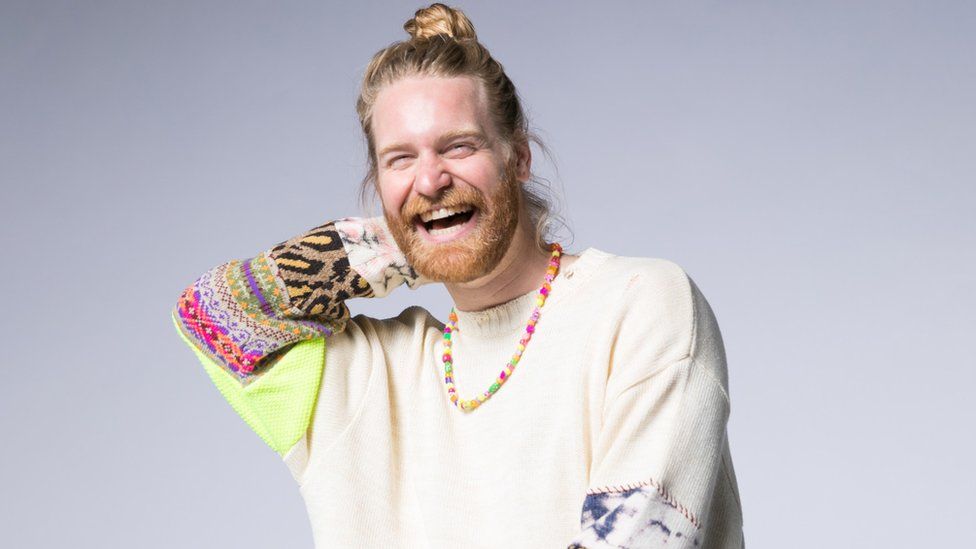
Image source, EBU Image caption,
After Eurovision, Sam Ryder has plans to release new music, as well as a tour with Paloma Faith
Sam and David only needed a moment’s pause before accepting the task of representing the UK.
“It was something that we hadn’t particularly thought about,” David says. “But the convincing factors were the excitement of the BBC, TaP’s enthusiasm for changing the narrative, and the love everyone had for Sam and for Space Man.”
Of course, a second place finish isn’t solely about a good song by a good singer. Sam was sent to every corner of Europe, familiarising fans with his song, and building up a unshakeable buzz.
Next, Eurovision veterans Dan Shipton and Marvin Deetman were brought in to design a stage show that would sell the song to a TV audience of 200 million.
“It was a team effort,” Dan says, “but the idea was to place Sam in a world of stars without using the digital screens
“The song has a real British heritage sound, so we wanted to draw on our inspirations of Queen and Bowie and how they used lighting and filters to produce ‘stars’ on camera.
“That was our starting point – to put him in a world of light and have him literally floating in space.”
And so the puzzle was complete: A great song, a performer who could sell it, a production that caught the eye, and a months-long diplomatic tour.
The result, as we all found out on Saturday night, was the UK’s best result at Eurovision since 1998. “A fairytale ending,” as Graham Norton put it,.
“It’s entirely deserved,” says Ken Bruce. “The feeling is that the UK has broken the taboo.”
And the BBC is determined not to squander that opportunity.
“We have to carry on,” says Andrew Cartmell, head of the UK delegation to Eurovision. “This cannot just be one off. We must continue.
“The British music industry is perhaps the best music industry in the world. This is the result we should have been having, and we have to make sure the UK is a powerhouse of Eurovision for years to come.”
“Watch this space,” says Sam. “The UK is going to be a force next year. It’s gonna be mad. The UK is going to bust down doors to be a part of Eurovision next year.
“I can’t wait to see it.”
![]()
Follow us on Facebook, or on Twitter @BBCNewsEnts. If you have a story suggestion email entertainment.news@bbc.co.uk.